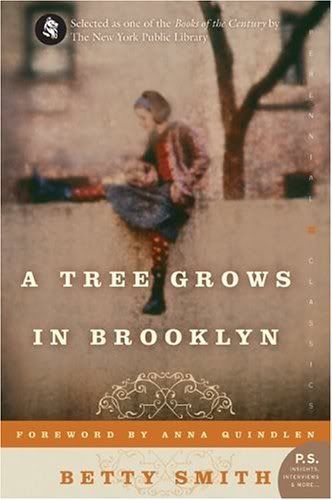 The cover of the book with the introduction by Anna Quindlen claims it was chosen as one of the Books of the Century by the New York Public Library, and I have no trouble believing it. It's not deep or metaphorical or philosophical or anything, at least not in the way most literature we study is. A Tree Grows in Brooklyn is probably the most accessible literary masterpiece I have ever read in my entire life, and for that reason, it's one of my new favorites.
The cover of the book with the introduction by Anna Quindlen claims it was chosen as one of the Books of the Century by the New York Public Library, and I have no trouble believing it. It's not deep or metaphorical or philosophical or anything, at least not in the way most literature we study is. A Tree Grows in Brooklyn is probably the most accessible literary masterpiece I have ever read in my entire life, and for that reason, it's one of my new favorites.It's the perfect picture of life during what seems to be the depression. I spent an entire day just reading this book, and I really felt like I was there. It's amazing, and the fact that it's largely autobiographical probably contributed to the realism. Also, I love how Francie's father is Irish, her mother is awesome, and the entire community Smith creates in this book is incredible and detailed and completely without pretension.
The realism is probably what makes this novel so incredibly heartbreaking. As one of my friends put it, Smith gets you at the beginning, the end, and all the way through. By the time Francie finds the roses on her desk after graduation, I was ready to excuse myself and have a good hard cry in the ladies' room as Francie herself does.
 I would have rather Ben had not entered the novel, but as Betty Smith really did marry a law student and follow him to Ann Arbor, I understand why she did it. Throughout the novel, Smith refuses to compromise her realism. Johnny Nolan didn't have to die, but he did, and Francie didn't have to make the decision to hand her life over to some pompous Brooklynite, but she did. That's the way the world works sometimes, and if Smith does anything well, it's portraying life.
I would have rather Ben had not entered the novel, but as Betty Smith really did marry a law student and follow him to Ann Arbor, I understand why she did it. Throughout the novel, Smith refuses to compromise her realism. Johnny Nolan didn't have to die, but he did, and Francie didn't have to make the decision to hand her life over to some pompous Brooklynite, but she did. That's the way the world works sometimes, and if Smith does anything well, it's portraying life.NEXT: The Omnivore's Dilemma




No comments:
Post a Comment